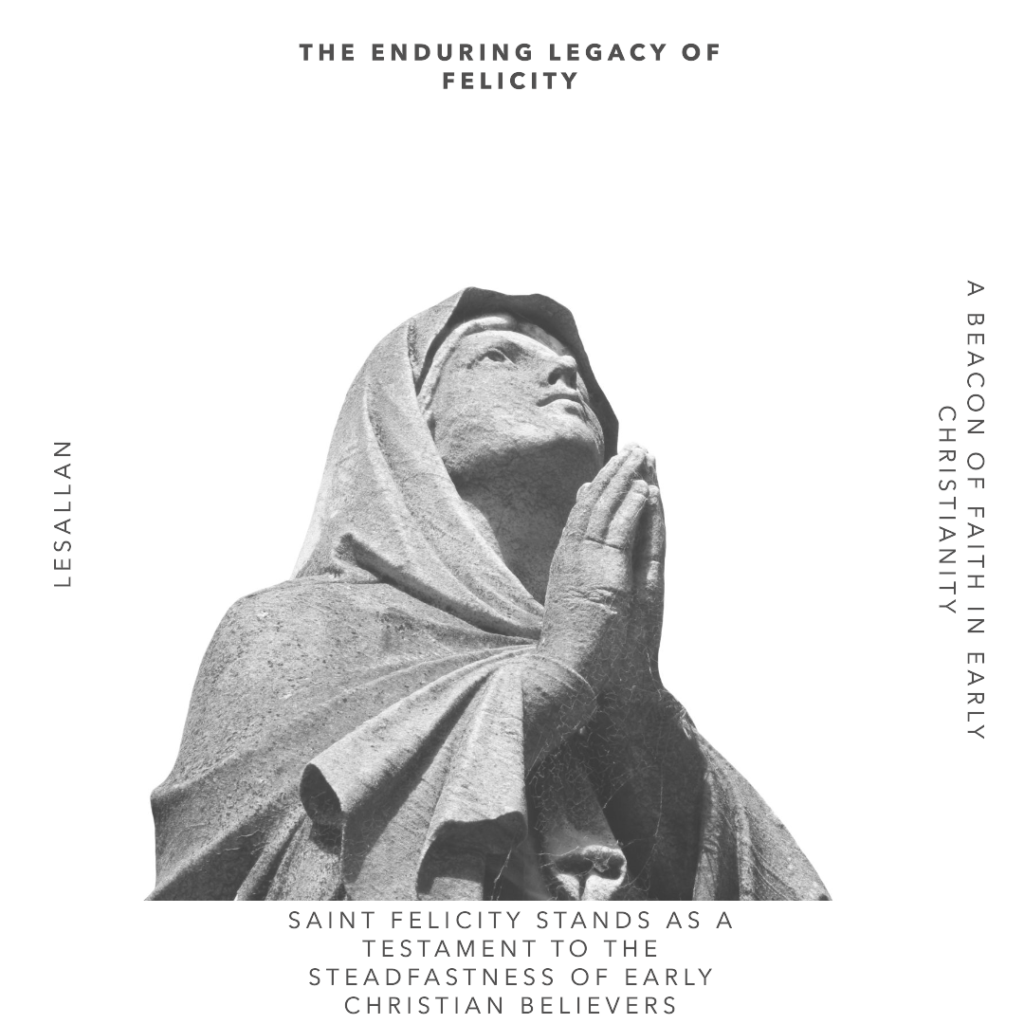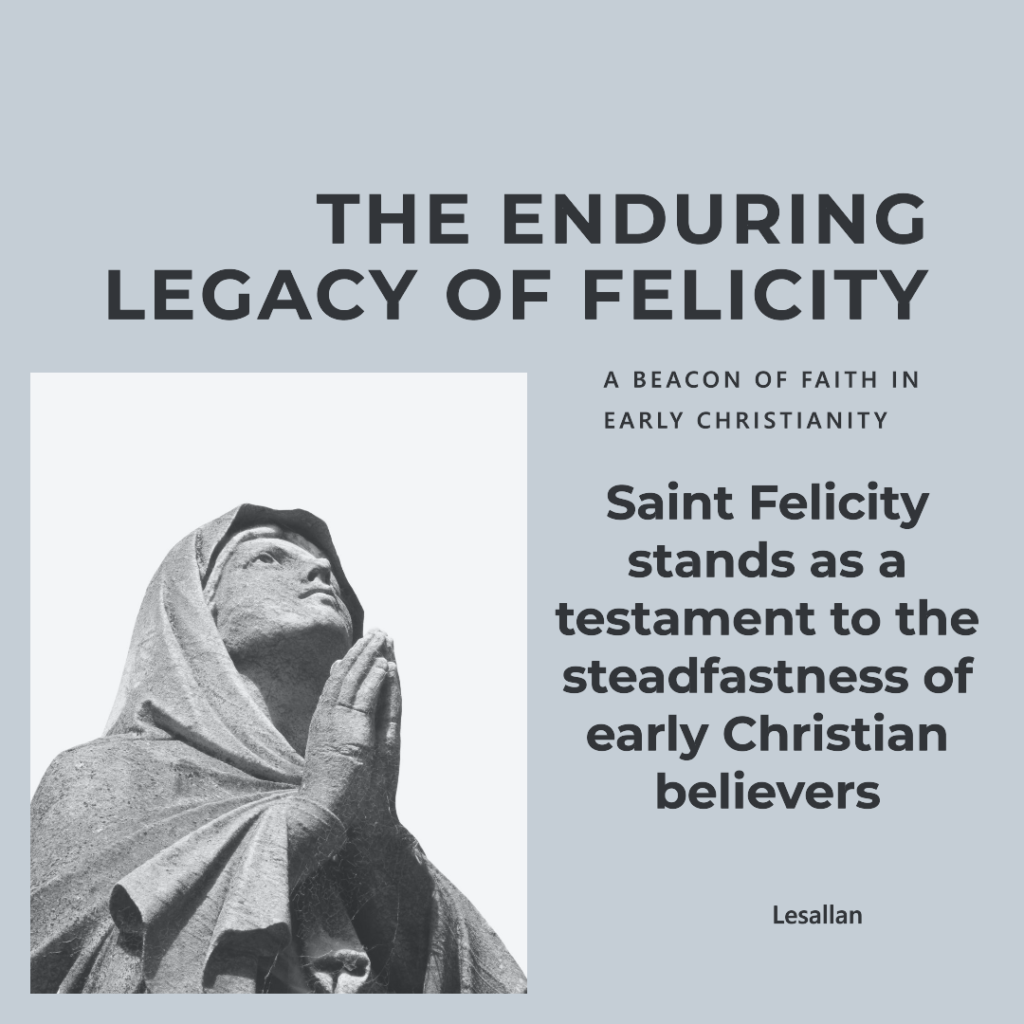Lesallan Bostron – June 7, 2024

Ohio Christian University
THE2300 Historical Theology I (ONLSP242)
Dr. Trent Lambert
June 7, 2024
The Enduring Legacy of Felicity: A Beacon of Faith in Early Christianity
The early Christian church was not just a historical institution, but a community characterized by accounts of unwavering faith and the ultimate sacrifice of martyrdom. Among these narratives, the story of Saint Felicity stands as a testament to the steadfastness of early Christian believers. This paper delves into how Felicity’s steadfast faith, spiritual force, and martyrdom contributed to the fortification of church structures and the spiritual resilience of the early Christian community. Her story also provided a beacon of hope and inspiration for future generations of Christians.
Felicity, alongside Perpetua, displayed immense courage in the face of martyrdom in Carthage circa 203 CE. Their narrative is particularly documented in “The Martyrdom of Saints Perpetua and Felicitas,” Musurillo, H. (1972). This piece is something that offers a vivid glimpse into the lives of those who shaped the church’s history through their unwavering faith and sacrifice. As Ortega (2021) notes, “The holy martyrs Perpetua and Felicity were among the most outstanding figures in the early centuries of Christianity. The Act of Martyrdom of Perpetua and Felicity was one of the widespread documents in the Church during their time.”
Felicity’s martyrdom and the dissemination of her story played a pivotal role in the development of church structures. Her narrative not only influenced the formation of Christian communities and the church’s approach to persecution but also significantly impacted the roles of women in the church. Her story empowered women to take on more active and influential positions, reshaping the social dynamics of the early Christian community. The early Christian communities consisted of people who were bound by their faith in Jesus and their obligation to live out his lessons in their common activities. As a mother and a martyr, Felicity’s example resonated with many early Christians and helped shape church life’s communal and familial aspects.
Felicity’s martyrdom was a pivotal moment in the annals of early Christian history. It served as a compelling narrative that underscored the unwavering determination of early Christians to uphold their faith in the face of Roman persecution. Her story, transmitted through both oral tradition and written accounts, played a significant role in shaping the development of church structures. It exemplified the virtues of steadfastness and sacrifice that became integral to the Christian identity.
The broader historical impact of Felicity’s martyrdom is seen in how her sacrifice, alongside Perpetua, resonated within the wider Roman society and influenced the perception of Christians at the time. The early church faced persecutions early on in its history, and saints like Felicity are well-known names among the martyrs. Her story and others played a crucial role in converting non-believers to the Church, inspiring them with the women’s bravery and perseverance (March 07, 2024).
While Felicity’s strengths are well-documented, her weaknesses are less so. The early church had to reconcile the loss of a mother and her unborn child with the virtues of martyrdom. Theological discussions on Saint Felicity often highlight her unwavering faith, but may not provide a complete picture of her life’s complexities and the full spectrum of her character.
Felicity’s example serves as a powerful guide for living a life dedicated to Christ. Her story encourages believers to confront trials with courage and to adhere firmly to their convictions. Reflecting on her life, one can find inspiration to live purposefully and to make sacrifices for the greater good, just as Felicity did for her faith (Musurillo, 1972).
Felicity’s enduring legacy embodies courage, faith, and sacrifice. Her martyrdom poignantly evokes the strength of conviction and the thoughtful influence that a single person can have on the history and evolution of the church. Contemplating Felicity’s life inspires us to ponder how we can live with a similar level of faith and dedication.
Felicity’s life is captivating due to her extraordinary courage and conviction. As an expectant mother and a catechumen, she faced persecution with remarkable tranquility and determination. Her willingness to endure suffering for her faith, even unto death, underscores the Christian message’s profound influence on individuals during this tumultuous period (Musurillo, 1972).
References:
March 07, L. G. (2024, March 7). Sts. Perpetua and Felicity: Mothers who martyred for Christ. RVA. https://www.rvasia.org/saints/sts-perpetua-and-felicity-mothers-who-martyred-christ
Musurillo, H. (1972). The Martyrdom of Saints Perpetua and Felicitas. https://www.ssfp.org/pdf/The_Martyrdom_of_Saints_Perpetua_and_Felicitas.pdf
Ortega, R. (2021). Saint Perpetua and Saint Felicity. Early Christians. https://www.earlychristians.org/saint-perpetua-and-saint-felicity/



